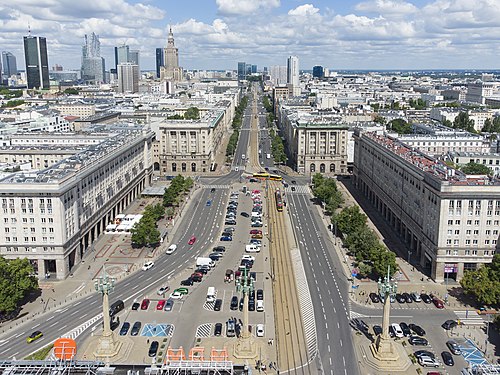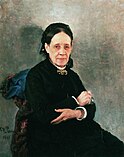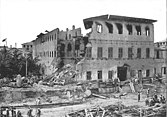From today's featured article
Nadezhda Stasova (1822–1895) was an educator and one of the earliest leaders of the Russian women's movement. She was born into a noble and wealthy family; Tsar Alexander I of Russia was her godfather, and she received extensive private tutoring as a child. In adulthood, she dedicated herself to women's empowerment. Along with Anna Filosofova and Maria Trubnikova, she founded and led several organizations designed to promote women's cultural and economic independence, including a publishing cooperative. In a decades-long effort, they successfully pushed government officials to allow higher education for women, although continual opposition sometimes limited or even reversed their successes. Stasova eventually became the lead organizer of the Bestuzhev Courses for women in 1878, but a decade later was forced to resign under political pressure. She continued her work on women's issues right up until her death in 1895, mentoring and inspiring younger feminists. (Full article...)
Did you know ...
- ... that Titiou Lecoq (pictured) only realized that "women did not rule the universe" after she left home?
- ... that Brandiose's design work for the Rocket City Trash Pandas helped the team sell $4 million in merchandise before it played its first game?
- ... that Tupou VI was crowned by D'Arcy Wood, an Australian, in order to respect the tradition of native Tongans not touching the king's head?
- ... that Aleister Crowley's 1941 manifesto controversially asserts a human right to commit tyrannicide?
- ... that Begüm Pusat, a 15-year-old Turkish wheelchair basketballer, was one of the youngest players at the 2019 Women's U25 World Championship?
- ... that by losing her constituency of South West Norfolk in 2024, Liz Truss became the first former UK prime minister since 1935 to lose their seat?
- ... that Carey Wright implemented literacy reforms that led to the "Mississippi Miracle"?
- ... that Upper Ivory Coast was created from the former French Upper Volta to facilitate the provision of forced plantation labour?
- ... that Quintus Quincy Quigley preferred Angles to a ring?
In the news
- In cycling, Katarzyna Niewiadoma (pictured) wins the Tour de France Femmes.
- Doctors strike and protests occur across India after the rape and murder of a female physician in Kolkata.
- Paetongtarn Shinawatra becomes Prime Minister of Thailand after Srettha Thavisin is dismissed by the Constitutional Court.
- The World Health Organization declares the mpox epidemic to be a global health emergency.
On this day
August 27: Independence Day in Moldova (1991)
- 410 – The sacking of Rome by the Visigoths ended after three days.
- 1896 – In the shortest recorded war in history (pictured), the Sultanate of Zanzibar surrendered to the United Kingdom after less than an hour of conflict.
- 1955 – The first edition of the Guinness Book of Records was published.
- 1964 – South Vietnamese junta leader Nguyễn Khánh entered into a triumvirate power-sharing arrangement with rival generals Trần Thiện Khiêm and Dương Văn Minh, both of whom had been involved in plots to unseat Khánh.
- 2009 – The Myanmar military junta and ethnic armies began three days of violent clashes in the region of Kokang.
- Henry Edwards (b. 1827)
- Rufus Wilmot Griswold (d. 1857)
- Don Bradman (b. 1908)
- Ieva Simonaitytė (d. 1978)
Today's featured picture

|
|
Warsaw is the capital and largest city of Poland, located on the Vistula in the east-central part of the country. It has an estimated population of 1.86 million, within a larger metropolitan area of 3.27 million residents, and it is a major cultural, political and economic hub. Warsaw originated as a small fishing town in Masovia, rising to prominence in the late 16th century when Sigismund III moved the Polish capital and his royal court from Kraków. It was the de facto capital of the Polish–Lithuanian Commonwealth until 1795 and then the seat of Napoleon's Duchy of Warsaw. The 19th century and its Industrial Revolution brought a demographic boom. Warsaw was bombed and besieged at the start of World War II in 1939, and its infrastructure and population suffered during the systematic razing which followed the Warsaw Uprising in 1944. The modern city features many historic monuments, including the reconstructed Old Town, designated a World Heritage Site. This 2022 photograph shows an elevated view of Warsaw's Constitution Square, looking northwards down Marszałkowska Street. Photograph credit: Emptywords
Recently featured:
|
Other areas of Wikipedia
- Community portal – The central hub for editors, with resources, links, tasks, and announcements.
- Village pump – Forum for discussions about Wikipedia itself, including policies and technical issues.
- Site news – Sources of news about Wikipedia and the broader Wikimedia movement.
- Teahouse – Ask basic questions about using or editing Wikipedia.
- Help desk – Ask questions about using or editing Wikipedia.
- Reference desk – Ask research questions about encyclopedic topics.
- Content portals – A unique way to navigate the encyclopedia.
Wikipedia's sister projects
Wikipedia is written by volunteer editors and hosted by the Wikimedia Foundation, a non-profit organization that also hosts a range of other volunteer projects:
-
Commons
Free media repository -
MediaWiki
Wiki software development -
Meta-Wiki
Wikimedia project coordination -
Wikibooks
Free textbooks and manuals -
Wikidata
Free knowledge base -
Wikinews
Free-content news -
Wikiquote
Collection of quotations -
Wikisource
Free-content library -
Wikispecies
Directory of species -
Wikiversity
Free learning tools -
Wikivoyage
Free travel guide -
Wiktionary
Dictionary and thesaurus
Wikipedia languages
This Wikipedia is written in English. Many other Wikipedias are available; some of the largest are listed below.
-
1,000,000+ articles
-
250,000+ articles
-
50,000+ articles



